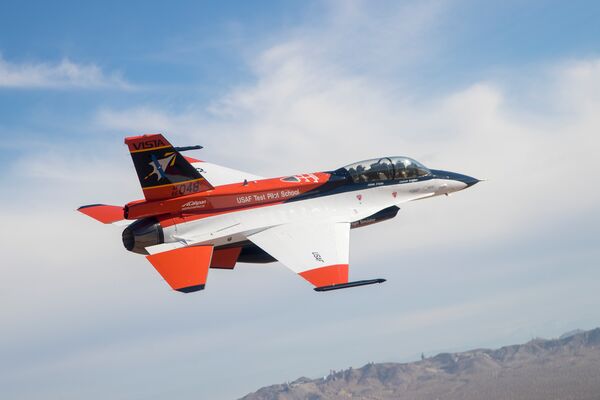
The NF-16D VISTA was redesignated as the X-62A in June 2021. (AFRL)
The US Air Force Research Laboratory (AFRL) has disclosed plans to begin operating a heavily modified, two-seat F-16 fighter later this year in support of its Skyborg tactical autonomy programme.
Part of the US Air Force (USAF) Test Pilot School's fleet, the NF-16D Variable In-flight Simulator Aircraft (VISTA) has been redesignated as the X-62A to reflect its role as a one-of-a-kind experimental system. AFRL's Strategic Development Planning and Experimentation Office has invested USD15 million to upgrade the aircraft for testing in support of the Skyborg Autonomy Control System.
According to AFRL, the X-62 is being introduced to the Skyborg flight-test programme to fulfil demands for a “mature, tactically relevant platform” that can “rapidly develop and mature tactical autonomy on an appropriate timeline”. The aircraft is modified to emulate the performance characteristics – both flight control laws and autonomy capabilities – of other platforms.
Skyborg is a Department of the Air Force Vanguard project intended to develop and integrate full-mission autonomy with low-cost, attritable unmanned air vehicle technology to enable airborne combat mass in contested environments using uncrewed aircraft as an adjunct to manned teammates. During this effort, AFRL is prototyping a suite of autonomy and unmanned system technologies equipped with capabilities that can support a range of missions.
Since March 2021 AFRL's Autonomous Aircraft Experimentation team has executed 16 live-test events focused on evaluating the Leidos-developed Skyborg Autonomy Control System. These tests have used uncrewed air vehicles in the shape of the Kratos Unmanned Systems Division's XQ-58 Valkyrie, the same company's UTAP-22 Mako, and General Atomics' MQ-20 Avenger.
Looking to read the full article?
Gain unlimited access to Janes news and more...







